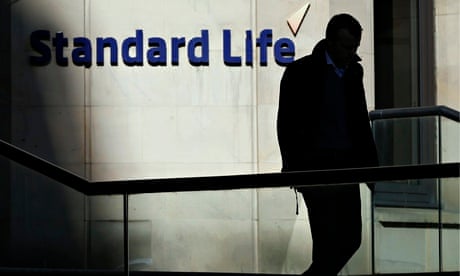Shares in Britain's main pension providers fell dramatically on Wednesday after George Osborne announced the most far-reaching reforms of the taxation of pensions in nearly a century.
Partnership Assurance, the leading annuities provider, saw its shares fall by 55% to 143p on the day the chancellor announced that members of money pur chase – or defined contribution – pension schemes would no longer be forced to buy an annuity on retirement. Half of the fall in the troubled specialist provider of annuities, which was floated in June, took place before the chancellor spoke.
Shares in the big providers – Legal & General, Aviva and Standard Life – fell between 3.12% and 8.37% , according to Bloomberg, due to fears for the future of the market in annuities – the stream of income paid by pension providers in exchange for receiving all or part of the funds in their pension pot.
The National Association of Pension Funds warned that the changes could end up making people more vulnerable to poverty. It said: "It is concerning that there appears to be little robust modelling to reassure us the government has understood the risk that a number of people will run through their pension pots far too quickly. We fear these reforms, without careful scrutiny, will leave a large swath of people vulnerable to poverty in old age."
Ed Balls said that the changes could end up benefiting the wealthy and eventually lead to a major fall in tax receipts. The shadow chancellor highlighted the findings of the Office for Budget Responsibility which said that the changes would initially generate extra revenues in 2016-17 before becoming a cost to the exchequer in the 2030s.
Balls issued the warning after the chancellor announced he would ease the burden on the 13m people with money purchase pension schemes by removing the cap on the amount they can take out of their pension pot. Anyone aged 55 or over who takes more than a quarter of their pension tax free would no longer face the current "punitive" 55% tax rate from April next year. They will instead be taxed at the normal marginal rates.
The chancellor also announced that the 300,000 people who retire each year with defined contribution pensions would not be forced to buy an annuity.
Britain's historically low interest rates, coupled with an ageing population, have prompted annuity providers to offer relatively low guaranteed incomes, causing mounting anger.
Osborne told MPs that his reforms were designed to challenge the "patronising view" that pensioners, and those planning for retirement, could not be trusted to make the right decisions.
He said: "Most people still have little option but to take out an annuity, even though annuity rates have fallen by a half over the last 15 years. The tax rules around these pensions are a manifestation of a patronising view that pensioners can't be trusted with their own pension pots. I reject that.
"People who have worked hard and saved hard all their lives, and done the right thing, should be trusted with their own finances … What I am proposing is the most far-reaching reform to the taxation of pensions since the regime was introduced in 1921."
A Treasury consultation, published with the budget, showed the government is keen to open up access to pension pots to ease the costs of social care. The document said: "The government expects that the proposed changes to the tax rules from April 2015 will allow industry much greater flexibility to develop new products which meet people's social care needs."
Treasury sources said the changes were designed to help people in their 30s, 40s and 50s who are preparing for retirement. A senior Treasury source said: "This is a tax cut from 55% to 20%. This is going to be extremely popular amongst people planning for retirement, approaching retirement and providing total flexibility."
One source acknowledged that the changes would lead to an initial increase in tax receipts because some people might be encouraged to draw down more funds from their pension pots earlier, but there would then be a fall in tax receipts in the 2030s.
The source said: "It starts costing us in about 2030 because we are bringing forward some tax revenues that would have been paid in the 2030s to now. Previously people would have annuitised and paid tax on their income over their whole lifetime. Some people may now choose to bring some of that money forward and pay the tax earlier."
Balls raised concerns about the fall in tax receipts and whether the reforms would end up benefiting the wealthy. He said: "Reform in annuities is a good thing. But to go from that to abolishing the requirement to have annuities entirely is a very big step.
"Are we going to be encouraging people to save large amounts of money – more than they need for their retirement – in tax-advantaged pension vehicles in order to be able to withdraw that money on retirement to use it for other non-pension purposes which could end up substantially reducing the amount of tax which ends up flowing into the exchequer? You could save tax-advantaged through your working life if you are on a very high income and then move all that money into inheritance-style trust to avoid tax after the age of 60."





Comments (…)
Sign in or create your Guardian account to join the discussion